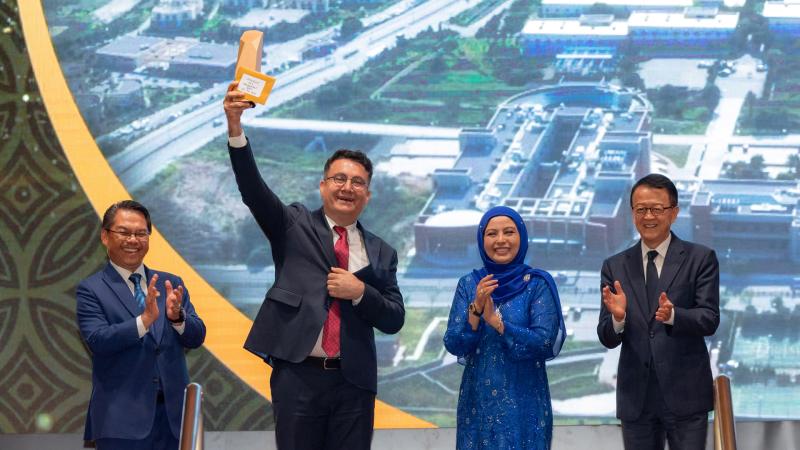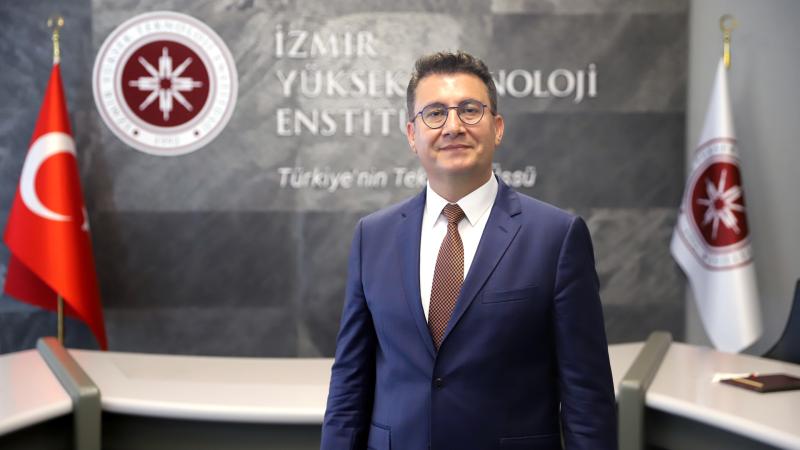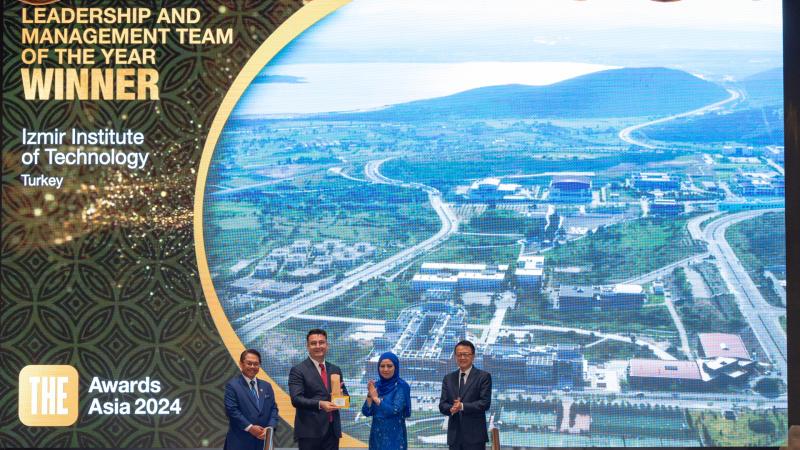An Alumnus of the TWAS Young Affiliates programme, Yusuf Baran of Türkiye, has received recognition on behalf of his scientific institution from Her Majesty Raja Zarith Sofiah, Queen of Malaysia.

Baran received the 2024 Leadership and Management Team of the Year, for his project 'A New University, A New Vision for the City', with the Izmir Institute of Technology (IZTECH), in Izmir, Türkiye.
Through this project, the IZTECH administration convinced all interested parties, including government bodies, to make the Institute a hub for Türkiye, and this gave Izmir a new role as a global research and innovation centre. In the wake of this, IZTECH Technopark was tripled.
Her Majesty Raja Zarith Sofiah, Queen of Malaysia, personally delivered the honour to Baran on 29 April in Kuala Lumpur, Malaysia, at THE Awards Asia 2024, hosted by the London-based international rating platform Times Higher Education (THE). The special edition of the awards dedicated specifically to Asian excellence in higher education began in 2019.
"My commitment as the IZTECH rector has always aimed at exploiting the potential of this institution, and of the region where we are based," explained Baran. "Izmir is a modern city that hosts hubs dedicated to research and innovation, and is open to brilliant students coming from different parts of the world. IZTECH campus is truly competitive because it is where Teknopark Izmir has been headquartered since 2002, offering the perfect stage for innovation and technology development thanks to more than 250 R&D companies and entrepreneurs."

Since his appointment as the rector of IZTECH, in 2018, Baran worked to position the institute's name higher on the international scene. Indeed, this is not the first time that IZTECH, the only institute of technology in Türkiye, has received prestigious awards. Recent past acknowledgments include the Internationalization Strategy of the Year Award, in 2022, and an honourable mention in the 'Student Recruitment Campaign of the Year', in 2023.
At IZTECH, Baran has taken the lead in drafting a 'New Deal' to turn the institute into a sustainable place, where water and plastic are used mindfully, and energy usage follows sustainable policies. As an example, instead of using fossil fuels, IZTECH is using energy produced by the wind. Also, three fountains in the campus provide free potable water helping to reduce the use of plastic bottles, while rain is harvested and used to water the campus plants.
As a molecular biologist and geneticist, Baran is interested in the molecular mechanisms of cell death, drug resistance in cancer, and the biochemical pathways of tumours. But he is also keen on addressing technology policies and science diplomacy, so much that in 2022 he received the Regional Partner Award on Science Diplomacy, bestowed by the TWAS Central and South Asia Regional Partner (CASAREP).
His relationship with TWAS started in 2015 when he was elected a TWAS Young Affiliate. In 2016, he was named an Executive Committee member of the TWAS Young Affiliates Network (TYAN), a global network of accomplished young scientists from the global South, holding that position until 2021. In addition, he was among the participants in the American Association for the Advancement of Science-TWAS science diplomacy summer course, which receives financial support from the Swedish International Development Cooperation Agency (Sida), and AAAS. The course was held in Trieste, Italy, from 11 to 15 July 2021.
Then, in 2019 he became a TWAS Alumnus.
"The affiliation to TYAN gave me international visibility and increased my scientific network. But above all, it broadened my understanding of the transformative power of education, for a nation and for the society," Baran recalled.

What brought the Institute the first prize, he says, was the clarity of vision of IZTECH leadership. As its rector, Baran envisaged transformative interventions that gave the institute, the region, and the country a stronger voice within the international scientific platform, according to THE Awards Asia.
But, as IZTECH rector noted: "This award stems from an incredible teamwork involving academic and administrative staff, students and stakeholders who had an active role in our success. These efforts plan to reverse the brain drain, and help students to build their own professional vision and career locally."
According to Baran's vision, in fact, it will be upon today's students to bring meaningful contributions to national scientific and technological development. That's why after the COVID-19 pandemic, he also propelled the digital transformation, increasing online infrastructures and promoting online education.
It comes to no surprise that, taking the leadership on online procedures, has allowed IZTECH to rank third in terms of students' satisfaction for online education, according to the University Assessment and Research Center.
Cristina Serra

